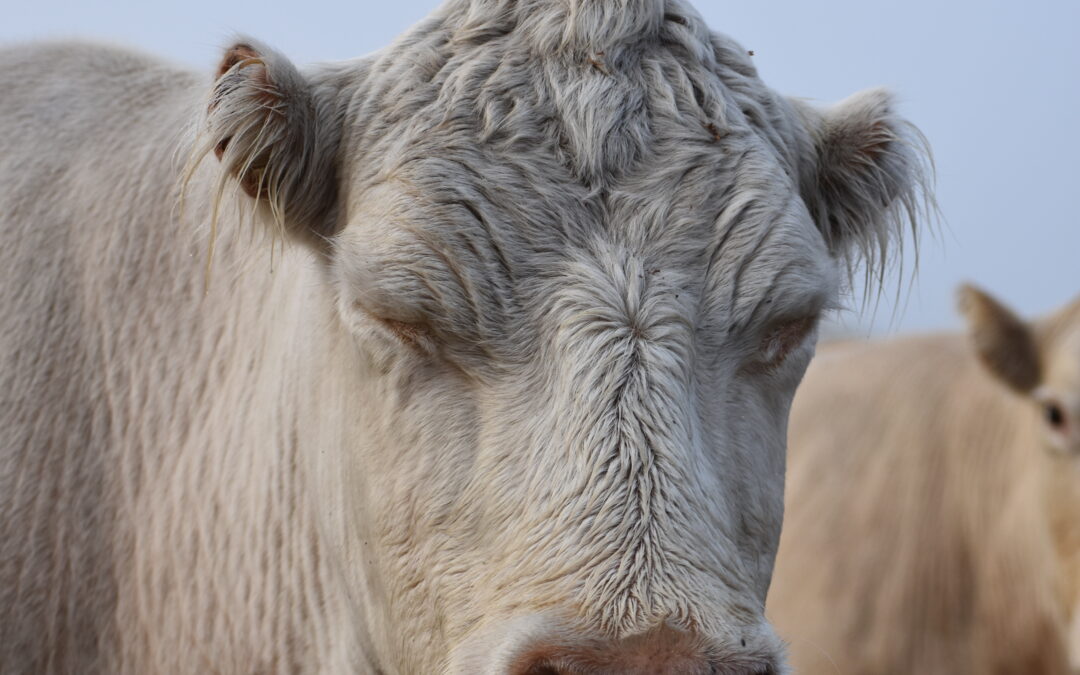The frostbitten heifer with a pink peeling nose is hauled up the steps of the silver-haired farmer’s steps, clunk, clunk, clunk. The two bedroom farm house is a mirage of gold in the screaming whorl of snow eviscerating the formerly flat and stubbled fields about 100 kilometres northeast of Maple Creek.
Red noses, black freckles, scarves pulled up over snotty faces, the farmers deposit calf 43 into the lime-green bathtub almost six steps away from their washer and dryer. While 43 stares into the darkness of her closed eyelids she listens to the hissing of the tap, the humming of the farmers, and the the clunk of her frozen legs, like wood, on the metal.
The throb begins as cool water and baby soap washes away the ice and the spit from her mother. The wind can no longer steal warmth, the snow and the cold eating through her hide and nestling around her organs has run down the drain. She dreams of her mother that night.
—
“What is summer, Mama?” 43’s son, the bull calf, asks her.
“Hmm. Let me think,” 43 teases.
“Just tell me, Mama,” the bull calf bawls and nuzzles into her side. He forgets himself and drinks heavily to sate his stomachs. His tail flits.
It has been a long time since the endless nights and frozen snot and the gnawing in her limbs were reality and not memory. Her joints carry with her the weight of a decade. Today the sun yawns, dew begins to gather itself and slip beneath the edge of snowbanks to hide until the fall, the earliest of flowers begin to bloom.
“Summer is heaven,” she says and it falls on deaf ears as the bull calf fills his belly.
The farmers are here early today, dressed in wide-brimmed sunhats and wearing the slight wear-and-tear of age: wrinkles around the nail-beds, extra clothing, deeper rings beneath the eyes. The last of winter’s hay is idling in the truck on the hill.
The gate to the south pasture is opened today to signal the end of winter. 43 feels her stomachs twisting into knots as the farmers stand like sentinels, like angel’s of death. 43 does not look up as she enters the pasture alone.
—
The end of winter reminds 43 of her mother. — the empty 2-litre coca-cola bottle with a stiff rubber nipple and warm milk attached to the sleeve of the farmer. Younger her would prance into the fields, with mud painted on her face like the young heifers.
43 stands on the hill as she watches the mechanical beast beep its way back into the stalls where she’d been found, closer to the children. She meets one of the farmer’s eyes, her mother, but 43 is not a human, and the farmer is not a heifer, so no thoughts are exchanged.
—
43 is not the first to cry for her son when the hay is gone and the gates are opened and the children stand in the metal beast.
“Mama?”
“Yes?”
“Where am I going?”
“To see summer, love.”
“Really?”
“Yes”
“What does it look like?”
43 dreams of the summer after she’d been born. The first time her skin didn’t ache from cold, and the first time she’d smelt life on the air — a cacophony of grasshoppers fighting for dominance with other bugs among the grass she ate, the smell of warm hide laying down in cool eddies to rest, birdsong while chewing cud.
“Close your eyes and dream of joy, my love,” she says as she presses nose to nose, intercepted by cold steel grates. The metal beast roars and neither 43 or the bull calf cry for each other.
“Dream of warm air, and soft grass, sunlit evenings when you’re nuzzled against me. Dream of when all that is worth living is present. That is summer.”
43 stands in silence. The fields are plush with purple flowers and the sky promises rain and a brighter future while she closes her eyes and dreams of summer.
